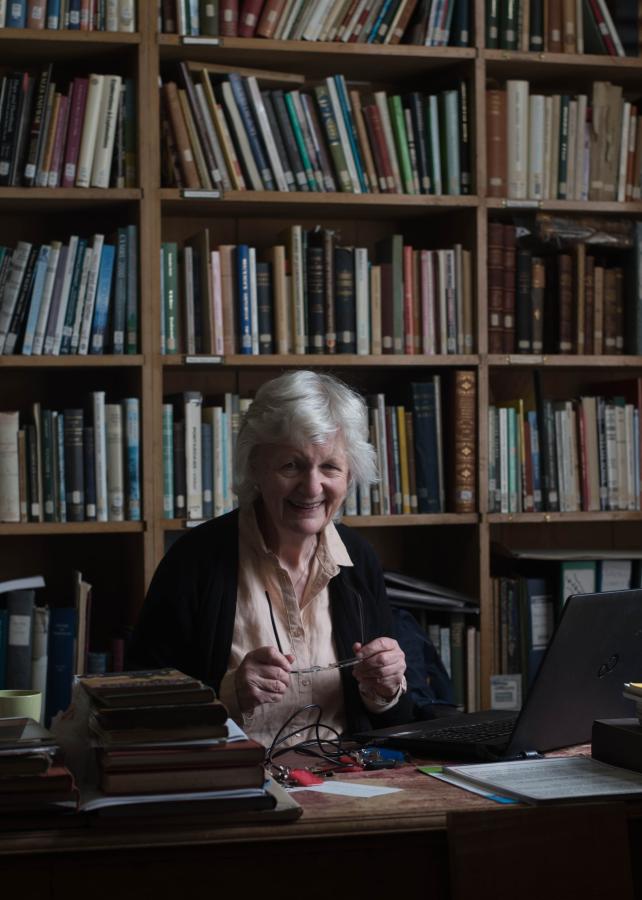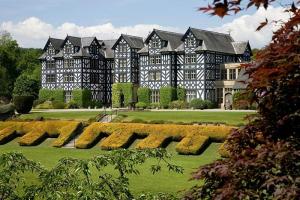Where are you from? I was born and grew up in Nottinghamshire, but have been based in Mid Wales since the late 1960s. Since 1981 I have lived in Newtown, Powys.
What is the subject of your doctoral research project? Proprietors, people, transition and change on a Welsh estate: Gregynog Hall, Montgomeryshire, 1750-1900. I joined ISWE in January 2018 to undertake a part-time PhD course.
What are your main research interests? The role of Welsh landed estates and their proprietors in society over the past four or five centuries, and the part they have played in the social, economic and political evolution of communities.
Tell us about your career so far and what led you to ISWE and your doctoral research project?
In the late nineteen-sixties I qualified as a Chartered Librarian after completing a two-year diploma at what was then the College of Librarianship, Wales, in Aberystwyth (it later became the Department of Library and Information Studies, UCW Aberystwyth). In 1969 I moved to Newtown, Montgomeryshire, to take up the post of the Schools Librarian for the County Library service, during which period I first got to know Gregynog Hall. In 1972 I moved to the same post in Denbighshire.
From 1974 to 1977 I was a student at the London School of Economics (self-financed for two of the three years) where I took a B.Sc (Econ) degree in Government and History. I subsequently worked as an Information Officer for the British Steel Corporation during the difficult years of steelworks closures. During this period I completed my second children’s novel (a first ‘pony book’ had been published by Harrap in 1968. It had also appeared in the USA and Germany) which was accepted by the American publisher of my first book. As my post at British Steel was about to be made redundant, I felt the time was right to move back to Wales to work on my career as a writer. I had already managed to purchase the terrace cottage where I still live in Newtown (having failed to find anything affordable in London, having spent all my savings on my degree), so I moved there permanently in early 1981. My book ‘The White Pony’ was published in the USA that year and was well-reviewed, but the publisher went bankrupt, still not having paid the contracted $1,000 advance.
A difficult few years ensued (not only for me, in that first half of the nineteen-eighties!) but in 1987 I took a part-time post as Administrator at Gwasg Gregynog, following which I was asked to take on some work in the Gregynog Library. 37 years later I’m still there, but in the meantime, I spent eight years as Schools Librarian at Welshpool High School. I also published three more novels for young people, this time with a specifically Welsh background.

Since 1987 Gregynog has been managed in succession by three academic wardens, four directors, an interim CEO and two CEOs, the latest being the current CEO David Chell. When the switch to Directors came, I began to have to tell the story of Gregynog to each one of them, and to do my best to convince them that the story is both interesting and important. I began to feel that a fuller history of Gregynog was needed to help sustain its place and identity in the twenty-first century. Not just a guidebook, but an academically respectable history that would set out to examine Gregynog’s place as a landed estate in the economic and social history of Wales. Fortunately, the Gregynog trustees agreed with me, and agreed to sponsor my research at ISWE.
What is your favourite thing about ISWE and being a doctoral researcher? ISWE – the staff, my supervisors, and my fellow researchers – has enabled me to turn my desire to research Gregynog’s history into a project which has culminated in my recently completed thesis. They have criticised, challenged, encouraged and above all kept me focused. As a librarian I enjoy the processes of research, the tracking down of sources, the journeys to distant libraries and archives, but I have also found being part of an academic community incredibly rewarding.
What is your proudest achievement since joining ISWE? Finishing my thesis, and having it accepted by my examiners at my viva in February this year with only a few minor amendments. Read more about it here.
What is your favourite historical period and why? Definitely the eighteenth and nineteenth centuries – the centuries in which the modern world was born. The age of the Enlightenment! The age of Revolutions! The Age of Improvement – and the greatest centuries for architecture, literature and music.
Your favourite place in Wales? I love the drive from my home in Newtown to Gregynog – I feel I must have one of the most beautiful commutes in Britain. But I also love some of the old castles – our local one, Dolforwyn is wonderful but my favourite is Castell Carreg Cennen in Carmarthenshire.
Can you recommend any books, TV shows, podcasts, blogs that you have enjoyed recently? I’m re-reading David Cannadine’s ‘The Victorious Century’ at the moment. It is a thick political history about Victorian Britain and it’s really excellent.
What are your hobbies or favourite extracurricular activities? Have you got any other interesting projects on the go? I have been a member of the Powysland Club since moving back to Wales in the 1980s. I am its Excursions Secretary and have just been appointed its Programme Secretary, so I think that will be keeping me pretty busy for the forseeable future. However, I am a lover of music, especially opera, and this year I sang in Montgomeryshire County Music Festival’s performance of Handel’s Messiah.

